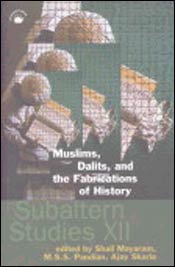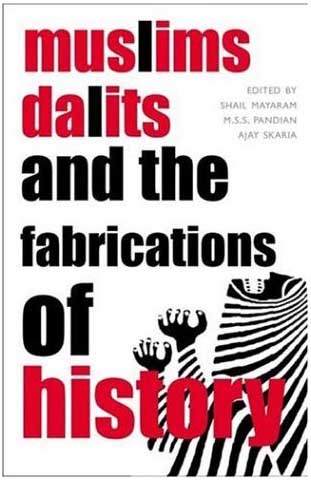
 Subaltern Studies No. 12
Subaltern Studies No. 12Muslims, Dalits, and the Fabrications of History
Edited by Shail Mayaram, M. S. S. Pandian, and Ajay Skaria
New Delhi: Permanent Black and Ravi Dayal Publisher, 2005. 322 p.
Library Record

 Subaltern Studies No. 12
Subaltern Studies No. 12
  |
Preface | vii | |
| Notes on Contributors | viii | ||
| 1. | SHAHID AMIN Representing the Musalman: Then and Now, Now and Then |
1 | |
| 2. | M.T. ANSARI Refiguring the Fanatic: Malabar 1836-1922 |
36 | |
| 3 | FAISAL FATEHALI DEVJI A Practice of Prejudice: Gandhi's Politics of Friendship |
78 | |
| 4. | MILIND WAKANKAR The Anomaly of Kabir: Caste and Canonicity in Indian Modernity |
99 | |
| 5. | ANUPAMA RAO Death of a Kotwal: Injury and the Politics of Recognition |
140 | |
| 6. | PRAVEENA KODOTH Framing Custom, Directing Practices: Authority, Property and Matriliny under Colonial Law in Nineteenth-century Malabar |
188 | |
| 7. | RASHMI DUBE BHATNAGAR, RENU DUBE, AND REENA DUBE A Poetics of Resistance: Investigating the Rhetoric of the Bardic Historians of Rajasthan |
224 | |
| 8. | PRATHAMA BANERJEE The Work of Imagination: Temporality and Nationhood in Colonial Bengal |
280 |


|
Studies XII [2005]
Subaltern Studies XII [2005]
Subaltern Studies XII [2005] |
Shahid Amin is Professor
of Modern History at the University of Delhi. He is the author of Event,
Metaphor; Memory: Chauri Chaura 1922-1992 (Delhi: Oxford University Press,
1995), and editor of Concise Encyclopedia of North Indian Peasant Life
(Delhi: Manohar, 2004).
M.T. Ansari is Reader at the Centre for Comparative Literature, University of Hyderabad, and has edited a volume entitled Secularism, Islam and Modernity: Selected Essays of Alam Khundmiri (New Delhi: Sage, 2001). He is revising his thesis as a book, In the Interstices of India: Islam and the Processes of Nation-formation. Prathama Banerjee teaches history at Lady Sri Ram College, Delhi. Her doctoral dissertation is titled 'The Politics of Time: "Primitives" and History-writing in a Colonial Society', SOAS, London University. Rashmi Dube Bhatnagar is revising her dissertation on Jonathan Swift. Renu Dube teaches rhetoric at the Communication Department of Boise State University and is currently revising her dissertation on Aristotle. Reena Dube teaches film at the English Department of Indiana University in Pennsylvania. Her book on Satyajit Ray and the differential value of cultural labour is in press. Rashmi Dube Bhatnagar, Renu Dube, and Reena Dube have coauthored In the Name of Woman: A Feminist History of Female Infanticide and the State in India, 1800-2003 (New York: SUNY, 2005). Faisal Devji is the Dr Malathy Singh Senior Lecturer, Department of History, Yale University. Praveena Kodoth is a research associate at the Centre for Development Studies, Trivandrum. Shail Mayaram is Senior Fellow at the Centre for the Study of Developing Societies, Delhi. She is the author of Against History, Against State: Counterperspectives from the Margins (New York/Delhi: Columbia University Press/Permanent Black, 2003) and Resisting Regimes: Myth, Memory and the Shaping of a Muslim Identity (Delhi: Oxford University Press, M.S.S. Pandian is currently a visiting Fellow, Sarai Programme, Centre for the Study of Developing Societies, Delhi. He was earlier on the faculty of the Centre for the Study of Social Sciences, Calcutta, and Madras Institute of Development Studies, Madras. His publications include Image Trap: M.G. Ramachandran in Films and Politics (New Delhi: Sage, 1992). Anupama Rao is Assistant Professor of South Asian History at Barnard College, Columbia University, and is working on a book titled The Caste Question: Untouchable Struggles for Rights and Recognition. She has recently authored Gender and Caste: Contemporary Issues in Indian Feminism. Ajay Skaria teaches history at the University of Minneapolis. He is the author of Hybrid Histories: Forests, Frontiers and Wildness in Western India (Delhi: Oxford University Press, 1999). Milind Wakankar teaches English at SUNY, Stony Brook, and is working on a manuscript titled 'Prehistory of the Popular: Caste and Canonicity in Indian Modernity'. Back to the top. We are happy to present this twelfth volume of Subaltern Studies. We have made a special effort to present the work of younger scholars concerned with questions of subalternity. Muslims, Dalits, and history--as both fabric and 'fabrication'--especially in relation to these communities, are the other clear links within the present volume. It has not been possible to include essays by more members of the editorial collective; we look forward to doing so in future volumes. Back to the top. |
Webber Philip
McEldowney
Last Update -
Count -